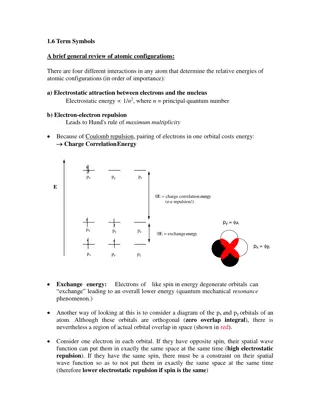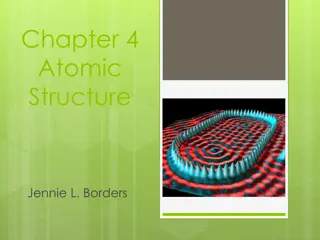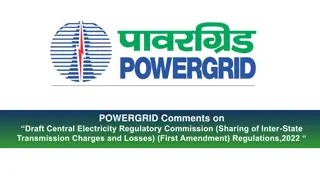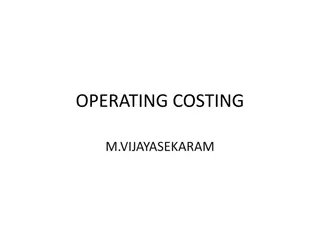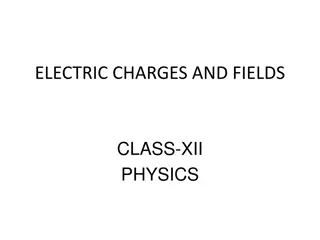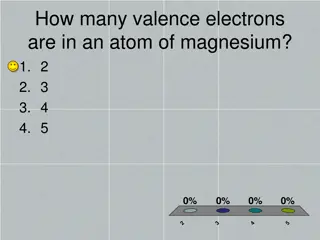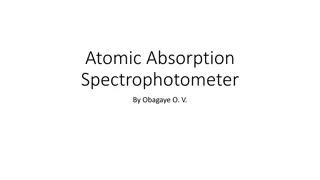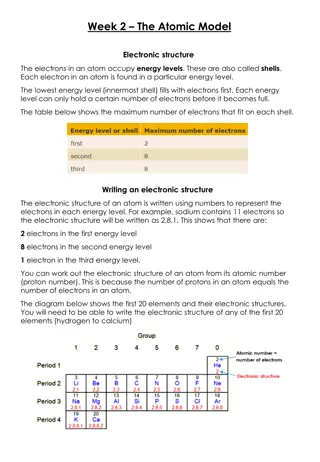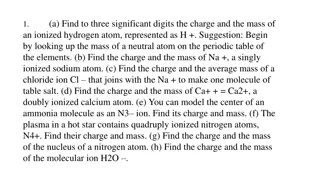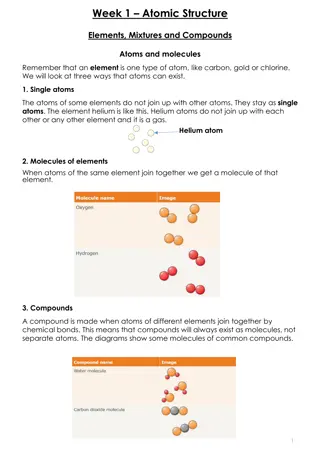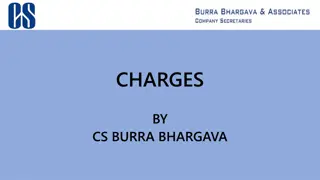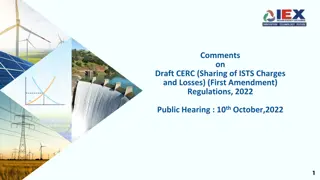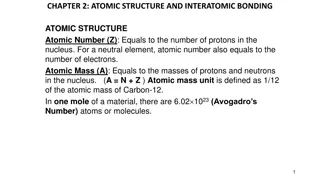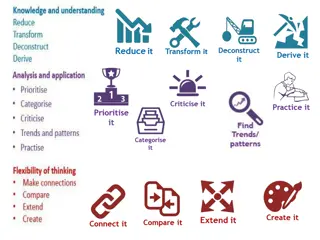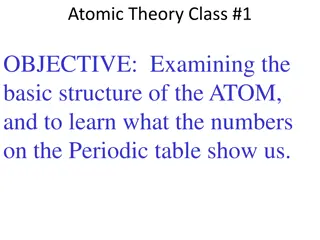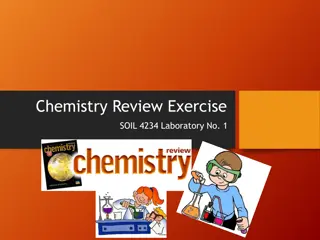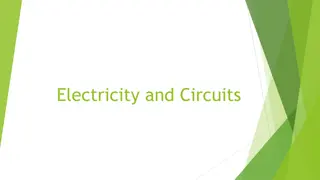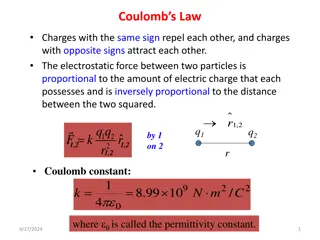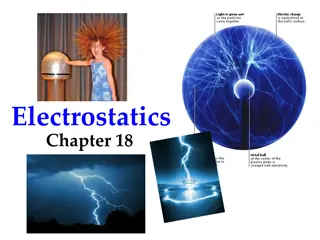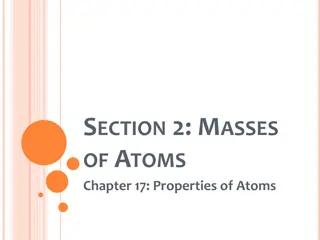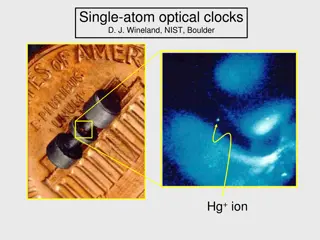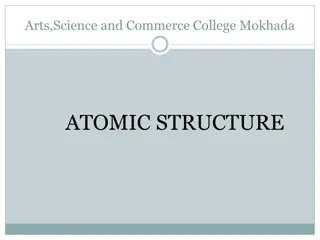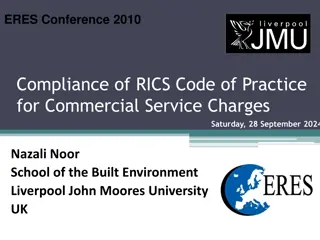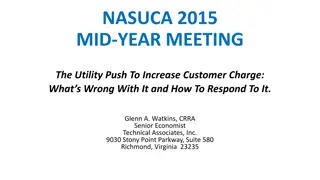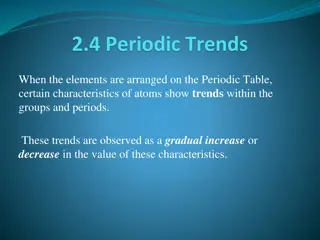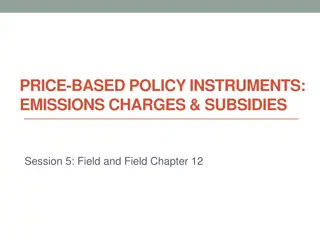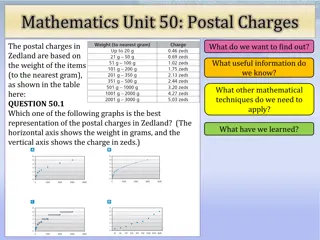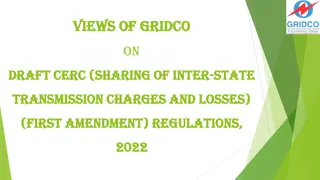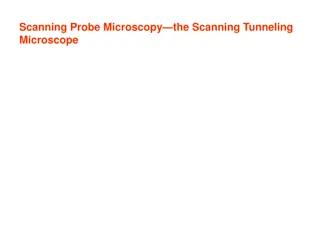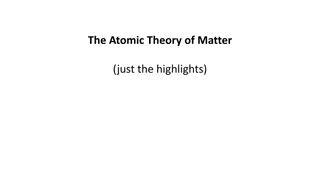Understanding Service Charges in Leasehold Properties
Service charges in leasehold properties are fees charged by landlords to cover maintenance, repairs, and services provided to the building. The lease agreement outlines what services are covered, how charges are calculated, and what landlords can charge for. Landlords can recover reasonable costs, b
1 views • 15 slides
Understanding Atomic Configurations and Term Symbols
The energy of atomic configurations is determined by electrostatic attraction between electrons and the nucleus, electron-electron repulsion, spin-orbit coupling, and spin-spin interactions. Term symbols in electronic spectroscopy specify atomic states using quantum numbers. Hund's rule and the Paul
8 views • 12 slides
Understanding Atomic Structure: The Evolution of Atomic Theories
Explore the journey of atomic theory from Democritus to Dalton and Thomson, uncovering the discoveries and concepts that shaped our understanding of the building blocks of matter. From the indivisible atoms proposed by Democritus to Dalton's theory of elements and compounds, and Thomson's experiment
6 views • 36 slides
Understanding Chemical Bonds and Ionic Compounds
Ionic bonds are formed when atoms transfer electrons to achieve stable electron configurations, resulting in the creation of ions with positive or negative charges. Metals are good conductors due to their ability to easily lose electrons. The charges of ions depend on the number of valence electrons
0 views • 49 slides
Unveiling the Journey of Atomic Structure Evolution
Delve into the historical perspectives and key theories that shaped our understanding of atomic structure. From Democritus' concept of indivisible atoms to Dalton's atomic theory and Thomson's discoveries on electric charges, this journey explores the evolution of atomic theory through the insights
0 views • 35 slides
POWERGRID
In response to the Draft Central Electricity Regulatory Commission's proposed amendment regarding the sharing of inter-state transmission charges and losses, POWERGRID provides insights on the treatment of transmission charges in specific cases, emphasizing the need for coordination in developing IS
0 views • 5 slides
Understanding Operating Costing in Service Industries
Operating costing is a method utilized by service-oriented businesses to ascertain the costs of providing services. Industries such as transportation services, welfare services, utility suppliers, and municipal services find operating costing beneficial. The method involves classifying costs into th
0 views • 6 slides
Understanding Electric Charges and Fields in Physics
Electrostatics is the study of forces, fields, and potentials arising from static charges, including positive and negative charges which interact based on the principles of like charges repelling and unlike charges attracting. By convention, electrons are considered negative, while protons are posit
0 views • 12 slides
Chemistry Concepts: Valence Electrons, Ion Charges, and Ionic Compounds
Explore various key concepts in chemistry such as valence electrons in magnesium, Lewis Dot structure for silicon, charges on ions like strontium, formation of ions to achieve noble-gas electron configuration, elements forming ions with specific charges, and the octet rule. Learn about the character
1 views • 48 slides
Understanding Atomic Absorption Spectrophotometry in Analytical Chemistry
Atomic absorption spectrophotometry (AAS) is a spectro-analytical technique used for quantitative determination of chemical elements through the absorption of light by free atoms. This method is vital in various fields like biophysics, toxicology, and archaeology, allowing the analysis of over 70 di
0 views • 9 slides
Understanding Electric Field Lines and Charges
Electric field lines provide a visual representation of the electric field around charges. They show the direction of the electric field and help understand the intensity of the field at different points. Field lines never cross each other and the tangent at any point on a line gives the field direc
0 views • 40 slides
Understanding Atomic Structure: Electrons, Energy Levels, and Historical Models
The atomic model describes how electrons occupy energy levels or shells in an atom. These energy levels have specific capacities for electrons. The electronic structure of an atom is represented by numbers indicating electron distribution. Over time, scientists have developed atomic models based on
0 views • 5 slides
Atomic Charges and Masses Calculations
Calculate the charges and masses of various ions and atoms, including hydrogen, sodium, chloride, calcium, nitrogen, and more. Explore scenarios involving electron count, electrical forces, gravitational forces, and their effects. The content encompasses physics concepts related to atomic structure,
0 views • 15 slides
Understanding Periodic Trends: Atomic Radius and Ionization Energy
The Periodic Table displays a systematic organization of elements based on their increasing atomic number, leading to periodic patterns in their physical and chemical properties. Key trends like Atomic Radius and Ionization Energy provide insights into the size of atoms and the energy required to re
1 views • 13 slides
Understanding Atomic Structure, Elements, Mixtures, and Compounds
Exploring the basics of atomic structure, including elements, mixtures, and compounds. Learn about single atoms, molecules of elements, and compounds formed by different elements. Understand the relationship between protons, neutrons, electrons, atomic number, and atomic mass. Test your knowledge on
0 views • 6 slides
Understanding Charges and Registration according to Companies Act, 2013
This comprehensive content covers the concepts of charges, registration of charges, fee structures, and penal provisions as per the Companies Act, 2013. It explains the duty of companies, fee structures for charges created before and after specific dates, and the importance of timely registration to
0 views • 12 slides
Comments on Draft CERC (Sharing of ISTS Charges and Losses) (First Amendment) Regulations, 2022 Public Hearing
Relevant provisions of the draft sharing regulations regarding transmission charges for T-GNA, applicable charges for collective transactions, and proposed mechanisms for embedded entities and GNA Grantees are discussed. Key issues include the uncertainty in determining exceeding drawl schedules and
0 views • 7 slides
Understanding Atomic Structure and Interatomic Bonding
Atomic structure is defined by the atomic number (Z) and atomic mass (A). Quantum mechanics governs atomic and subatomic particles, introducing discrete energy levels. The Bohr atomic model describes electrons orbiting the nucleus in defined orbitals. Quantum numbers characterize electron properties
0 views • 15 slides
Exploring the Fundamentals of Atomic Structure and Matter
Delve into the intricate world of atomic structure and matter through a comprehensive study covering topics such as subatomic particles, atomic models, and key concepts like atomic number and mass. Explore the fascinating properties of atoms, their components, and their interactions, gaining insight
2 views • 15 slides
Understanding the Basic Structure of Atoms: Atomic Theory Class #1
Exploring the fundamental components of atoms, including protons, neutrons, and electrons, their charges, symbols, masses, and locations within the atom. We delve into the concept of atomic mass units (AMU) and the structure of the nucleus, as well as the behavior of electrons in relation to the nuc
0 views • 108 slides
Chemistry Review Exercise: Periodic Table and Atomic Properties Review
This detailed content covers a review exercise on the Periodic Table and Atomic Properties of various elements. It includes information on atomic structures, fundamental physical constants, and common elements found in the Periodic Table. The content explores elements from Hydrogen to Osmium, detail
0 views • 16 slides
Understanding Electricity: Atoms, Circuits, and Charges
Discover the fundamentals of electricity through atoms, circuits, and electric charges. Learn how electrons flow, how circuits are created, and the key elements in a circuit. Explore conductors and insulators, and understand the basic properties of electric charges. Unveil the mysteries behind Coulo
0 views • 8 slides
Understanding Coulomb's Law in Electrostatic Interactions
Coulomb's Law states that charges with the same sign repel each other, while charges with opposite signs attract. The strength of the electrostatic force between two particles is directly related to the amount of charge each possesses and inversely proportional to the square of the distance between
0 views • 24 slides
Understanding Charges and Mortgages in Property Transactions
According to the Transfer of Property Act and Companies Act, charges and mortgages play significant roles in property transactions. This content explains the definitions of charges and mortgages, their distinctions, registration requirements, and the duty of companies to register charges. It covers
0 views • 22 slides
Understanding Development Charges and Bill 108: Key Insights from City of Windsor Task Force Meeting
Development Charges are fees imposed on new developments to fund growth-related infrastructure and facilities. Bill 108, More Homes, More Choices Act, brings changes to Development Charges in Windsor. Key legislation such as the Development Charges Act and Planning Act impacts the imposition and col
0 views • 23 slides
Methods of Solving Electrostatics Problems in Conductor Systems
Understanding problem-solving methods in electrostatics, including the use of images and fictitious point charges to analyze interactions between conductors and charges. Exploring scenarios with semi-infinite and finite conductors, grounded and insulated spheres, and the concept of equipotential sur
0 views • 36 slides
Understanding Electrostatics: Atomic-Level Insights into Electric Charges
Delve into the world of electrostatics to explore the study of electric charges and their interactions at the atomic level. Discover how positive and negative charges behave, how electrons and protons play a crucial role, and the conservation of charge in fundamental particles. Unravel the mysteries
0 views • 25 slides
Understanding Atomic Mass and Isotopes in Atoms
Explore the concept of atomic mass in atoms, learn to compute atomic mass and mass number, identify isotopes, and calculate the number of neutrons in an atom. Understand the significance of the atomic number and mass number in determining the characteristics of elements.
0 views • 14 slides
Understanding Atomic Structure in Introductory Chemistry
Explore the basics of atomic structure in Introductory Chemistry, covering topics such as representing elements with atomic symbols, isotopes, and atomic bookkeeping. Learn through visual aids and examples to enhance your understanding of elements, isotopes, and atomic properties.
0 views • 21 slides
The Importance of Atomic Clocks in Modern Technology
Explore the significance of precise timekeeping provided by atomic clocks, the fundamentals of atomic clocks, the advancements in single-atom optical clocks by experts like D. J. Wineland from NIST Boulder, the role of atomic energy state superpositions, and the practical operation of atomic clocks.
0 views • 33 slides
Understanding Atomic Structure: The Journey from Ancient Philosophers to Modern Theories
Exploring the evolution of atomic theory from ancient times to John Dalton's contributions, the concept of indivisible atoms forming elements, atomic spectra of hydrogen, and Bohr's atomic model. Delve into the limitations of Bohr's model and the complexities of multi-electron atoms.
0 views • 15 slides
Understanding Atomic Structure and Laws of Matter
Explore the fundamental concepts of atomic structure, including the size of atoms, evidence of atomic composition, and key laws of matter such as the Law of Conservation of Mass. Delve into the historical understanding of atomic structure and the contributions of significant scientists like John Dal
0 views • 29 slides
Understanding UK Commercial Service Charges: RICS Code of Practice and Proposed Solutions
This presentation delves into the compliance of the RICS Code of Practice for Commercial Service Charges in the UK. It covers key issues, such as confusion over service definitions and the ideal scenario for service charge management. The document highlights the importance of transparency, communica
0 views • 13 slides
Analyzing Utility Push for Increased Customer Charges
This content delves into the utility industry's trend of pushing for higher customer charges and its implications. It questions the use of high customer charges as a substitute for revenue decoupling, examines their impact on energy efficiency policies, and debates their alignment with competitive p
0 views • 11 slides
Understanding Periodic Trends in Atomic Characteristics
Periodic trends in atomic characteristics such as atomic radius, ionization energy, ion size, and electronegativity are essential in understanding the behavior of elements. These trends are influenced by factors like the energy levels and the number of protons and electrons in an atom. The atomic ra
0 views • 23 slides
Understanding Emission Charges for Environmental Policy
Explore the concept of emission charges as a policy instrument, where firms pay charges for every unit of effluent discharged to reduce emissions. The regulator sets the price to achieve efficient emission levels. Learn about setting charges in competitive environments, total abatement costs, and th
0 views • 18 slides
Analyzing Postal Charges in Zedland Based on Weight
The postal charges in Zedland are calculated based on the weight of items to the nearest gram. The task is to determine the best representation graph for these charges, with weight in grams on the horizontal axis and charges in zeds on the vertical axis. By analyzing the provided graphs and applying
0 views • 10 slides
Proposed Amendments to GRIDCO Regulations for Transmission Charges
The proposed amendments to the CERC regulations aim to alleviate the burden of transmission charges on GRIDCO and consumers in Odisha. The amendments focus on the sharing of inter-state transmission charges and losses, including the substitution of LTA/MTOA with GNA for sharing transmission charges.
0 views • 7 slides
Exploring Atomic Dimensions: Scanning Probe Microscopy
Delve into the world of nanoscale imaging with Scanning Probe Microscopy (SPM) techniques like Scanning Tunneling Microscopy (STM) and Atomic Force Microscope (AFM). Unlike optical microscopes, SPM methods break the diffraction limit by relying on intermolecular forces and quantum tunneling for unpa
0 views • 26 slides
Unveiling the Atomic Theory of Matter: Highlights
Matter comprises atoms and molecules in continuous motion, as evidenced by Brownian motion. The precise size of atoms was estimated at 10^-10 meters through experiments. The arrangements of molecules differ in solids, liquids, and gases, with Feynman highlighting the significance of the atomic hypot
0 views • 33 slides

